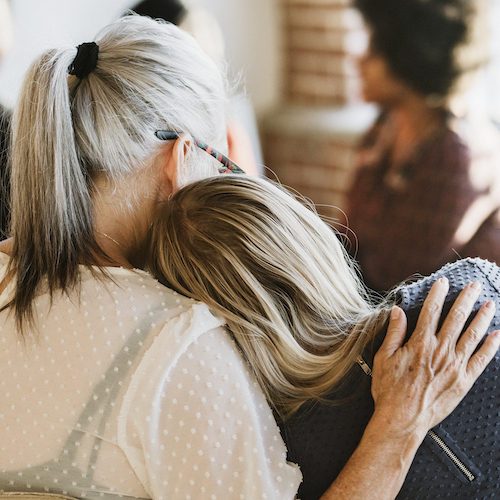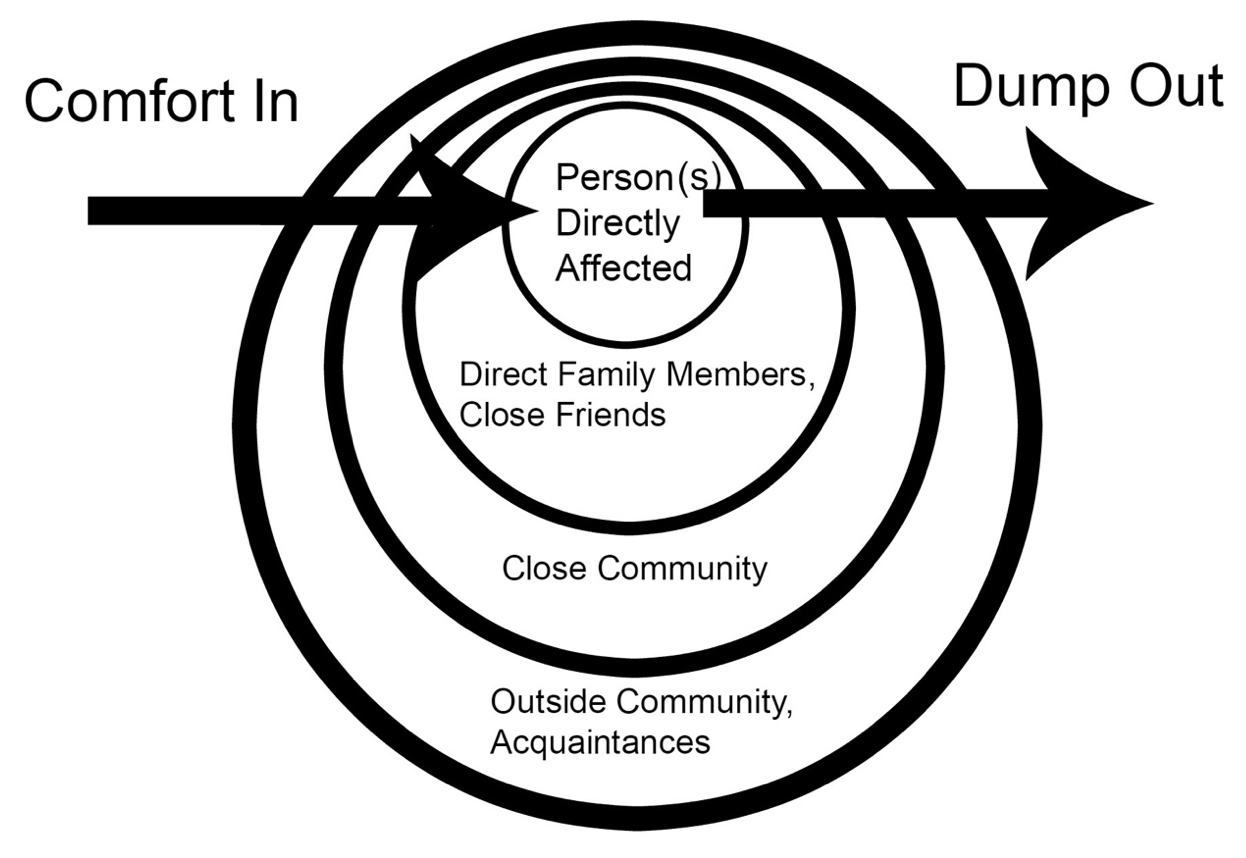I want to know how to help someone else
It is so hard to see someone you care about in pain. But we know that it can also be really hard to know how to help.
Everyone is unique, but on this page you will find some suggestions about some things you can try to support someone through pregnancy or baby loss.
Firstly, we want to thank you for visiting this page. One of the greatest gifts we can give to someone who is grieving is empathy: the motivation to want to understand and share the feelings of someone else.
We know that it can be really hard to know what to say or do. Many people share that they are worried about ‘getting it wrong’, upsetting their loved one, or making things worse. And whilst we cannot promise that you will always get it right every time, being able to listen to feedback and do things differently is often one of the most helpful things you can do.
Our aim is to provide knowledge that you can adapt to meet the individual needs of your loved one. With greater knowledge and understanding, we hope that you will feel more confident in leaning in and offering comfort and support.

Remember, your loved one is still your loved one
They have been through one of the most painful life experiences, but they are still your friend / sister / son and you still know them best. They will be changed by their loss, but please don’t forget who you knew before.
Get to know what they have experienced
It can be useful for you to better understand what they have been through. For example, reading information from trusted sources about the type of loss they have experienced as well as other people’s stories to really understand the lived experience of baby loss.
You can look through our Resources Directory to find a huge range of charities, books and podcasts.

Keep in touch
It is normal to feel an urge to keep away and to give our loved one time and space. Loss and grief is painful to witness, so it takes courage to move towards this. And we know that often this is fuelled by a fear of intruding during a deeply painful and private time. Indeed, some people will want to have time alone and may not want visitors, but this doesn’t mean to ignore them completely. Many people who are grieving describe the importance of connection and practical support.
How can you do this?
You could send a text message or voice note to tell them that you are thinking of them and that you are there. You might want to send a message saying that you would really like to visit if they are okay with visitors, but giving them the permission to say no if it doesn’t feel right for them:
I want you to know that I would really like to be there for you, so if you are up for visitors, I will be there. But if you would prefer not to, I won’t be offended in any way. I want to follow your lead.
Even if they say no for now, this does not necessarily mean to leave them alone forever. The early days and weeks following a loss can be filled with many practical issues, such as registering a birth, attending hospital appointments or planning a funeral. But the emotional recovery takes much longer, so your friend may need you even more weeks down the line.
Many bereaved parents say that having people text or call without any expectations is really helpful. So, you might want to caveat messages with:
"Please don’t feel you need to reply, I just wanted you to know that I am thinking of you” or “I’m going to call this evening, but please don’t worry about answering if you do not want to talk."

Saying something rather than nothing
It can often be said that ‘silence is deafening’ when a baby dies. We understand that there is such a huge fear of saying the wrong thing, but saying nothing can hurt more.
You might want to acknowledge that it is hard to know what to say, or that you know that nothing you say will be able to take away their pain, but you are willing to try. You may also want to invite your loved one to tell you if or when you say things that aren’t helpful so that you can learn not to repeat them.
Keep a check on platitudes
It is impossible to write a list of what to say / what not to say, because what is helpful for one person might not be helpful for others. However, one general rule would be to avoid platitudes or cliched statements, which often minimise the depth and complexity of someone’s experience.
Many bereaved parents say that statements such
as this are particularly distress and unhelpful:
- ‘At least’ – absolutely any statement that starts with these two words is likely to be invalidating of someone’s experience and emotional state
- ‘Everything happens for a reason’ – this may align with some people’s belief system, but it is absolutely not the case for everyone
- ‘You can try again’ – another baby will never replace the one who has died
Avoid comparisons – even if their situation seems very similar to your own
We often make comparisons when we want to demonstrate our empathy for someone else. By indicating that you know what someone is going through and what they feel, you might be attempting to help them feel less alone. And sometimes it can be helpful. However, often when we do this, we lose our ability to really listen and understand what the other person is going through.

Ask – and more importantly, listen
There is a fine balance to strike between asking questions and respecting someone’s privacy. A general rule is to ask if someone wants to talk about something and respecting when they say they don’t.
However, many people who experience the loss of their baby do want to talk about them, their pregnancy or birth. So, you might want to ask:
- ‘What is their name?’
- ‘Who do they look like?’
- ‘I’d love to hear about your pregnancy / birth if this is something you would like to share’
Being able to tell our stories can be a significant part of the healing process. Giving the time and space to listen to your loved one is a hugely important and privileged role.
Sitting with difficult feelings
Witnessing someone who is grieving and processing trauma can be very challenging. In those early days and weeks, they are likely to be a very different version of the person you know. They might be withdrawn, disconnected or very tearful. They may express anger or have less tolerance for daily stressors. This is all very normal.
You might find that you become anxious or overwhelmed when you are around them. You may feel as though you are walking on eggshells, unsure of what to say or do for the best in that moment. Your job isn’t to fix your loved one. However, being able to tolerate sitting with them as they go through some of these feelings is something you can do. Allowing the person to feel safe enough to feel their own feelings without the fear of being rejected by you. Often it isn’t what you say or do, but how you are with the person that makes the difference.

Remember their physical recovery as well as their emotional
At whatever stage someone loses a baby, there will be a need for physical recovery. Gifts of food, time and practical support can be invaluable when someone needs to rest.
Have ideas and be proactive
It is very easy to say ‘let me know if you need anything’ – and very often we truly mean it. But how often do people reach out and ask for help? Particularly when they are in the acute stages of grief and trauma. Asking someone to reach out to you for support can be an additional burden for a bereaved parent to bear as it hands over responsibility to them. They will then need to decide what they want, when they want it and then communicate it to you). Given that a grieving and traumatised brain struggles to process information, it is unlikely that they will be able to reach out.
Instead, we would encourage you to be curious, to be creative and to make contact. For example:
- ‘I was thinking that I might pop over with a meal tonight, is that okay with you?’
- ‘I bought you this gift as it made me think of you / [baby’s name], but if it isn’t right or you don’t like it, please tell me and I can exchange it’.
Acknowledge the difficult stuff
It is very possible (although not always) that you represent something painful for your loved one, for example if you have children or are pregnant / become pregnant. Your friend or relative does not choose to feel this way – and in fact, these feelings of sadness, anger, resentment or jealously can be a source of deep guilt and shame for them. How can you acknowledge this with them? Can you imagine how it would feel if you were in this situation? Would you want someone else to anticipate that this might be hard for you?
Maybe you could name this for them:
- ‘I can imagine it might be hard for you to see me right now [because I’m pregnant] so I completely understand if you would rather I stayed away’.
- ‘I have wondered if seeing [my baby / child] is hard for you right now, so I am going to come and see you on my own’.
We encourage you to be tentative and curious and never assume. Because it is possible that person feels absolutely fine with other babies and pregnant women, because they are not their baby. But understand that it could be very distressing for them.

Navigating pregnancy announcements
This is a very delicate area to navigate, so putting some time and thought into this is important. There are no hard and fast rules with how to do this as each person will manage receiving pregnancy announcements differently. However, holding in mind how your announcement might be received can make a huge difference.
This may mean avoiding announcing your news at an event or in a group setting. Maybe letting your friend or family member know ahead of time so they have some space to process it. Some people prefer to receive a text so that they can feel whatever feelings come up in that moment without having to hide them. Other people may appreciate a phone call.
Being pregnant is wonderful news and we do not want for you to hide it. But be aware that this may be a source of pain for a bereaved parent. And remember that this pain isn’t necessarily jealously for what you have, more a desperate longing for what they have lost and long for.
Getting your needs met
It is important to remember that you may have also lost a grandchild / niece / nephew so you will also be grieving too. It can also be very difficult seeing someone else in distress, particularly when there is nothing you can do to change the situation or fix it. It is also possible that this loss will trigger old memories of emotional difficulties for you. This is all very normal – supporting someone who is grieving can be hard.
Finding ways in which to get your emotional needs met is important for you but is also something you can do for the person / people directly impacted by the loss. By getting your own needs met, you will be increasing your capacity to support them.
Silk and Goldman’s Ring Theory can be helpful to hold
in mind when supporting someone else in need or crisis.
This theory suggests that the person who has experienced the loss or crisis is at the centre, and surrounding them are circles that represent the closeness of their relationships to others. Anyone in any of these circles can be impacted by the trauma or loss – the distance from the impacted person doe not necessarily represent the degree of distress because we are all individuals dealing with our own crises and difficulties.

However, what is important is the direction we provide and seek support for our own distress. Silk and Goldman suggest that whichever circle you are in, you look for support from those who are in a circle outside of your own (which they refer to as ‘dumping outwards’), whilst providing support inwards.
This doesn’t mean being completely shut off from your own emotions when with the person who has lots a baby. But it might mean finding ways to ensure you are not adding more responsibility onto your loved one to comfort and reassure you.
How we can help
For further information on resources and sources of support, please have a look through our Resources section. In particular, you may want to read the booklet for family and friends from Sands that explore in more detail things that could be useful to know. In addition, Petals now have an online support group for Grandparents.
Our directory includes a huge range of resources including charities, books, podcasts and where to find talking therapy

courses and webinars
Our online courses and webinars are developed and delivered by healthcare professionals and qualified experts in their field. (Coming soon)

